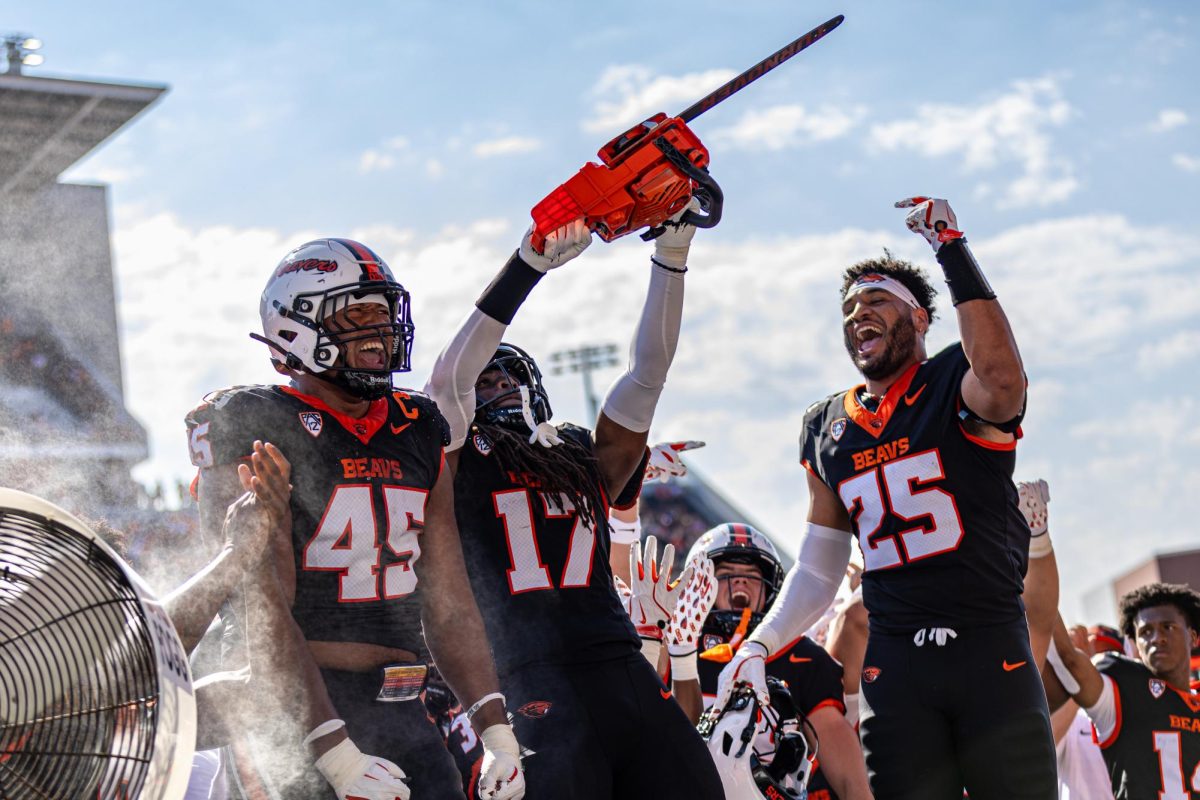Over the past five years, the annual rivalry football game between the Beavers and the Ducks has sparked passion between players and fans alike on and off the field.
For some fans, the debate is the name of the game.
The name change from “Civil War” to Rivalry Game isn’t the first time the name has been altered in the games history.
So far, the name has changed four times landing on the Rivalry Game title as the schools prepare to part from their shared conference.
To commemorate its many name changes, let’s dive into the long history of the Rivalry Game’s past names, and the debate that lies between the current and former name.
The first ever name for a game between the Beavers and Ducks was in 1894, between two teams, the Oregon Agricultural College Coyotes and the University of Oregon Lemon-Yellows.
Even before that, the OAC Coyotes were called the “Aggies” and the “Orangemen” in 1893.
22 years later in the rivalry, names still weren’t quite set in stone. OSU finally landed on the name we know today, the Beavers, in 1961.
The Lemon-Yellows became the “Webfoots” in 1902, when the school first used the name in the inaugural yearbook, according to the UO Special Collections and University Archives, until they became the Ducks in the 1920s.
During that time, the name of the annual rivalry game between the two schools was thrown back and forth between the “Oregon Classic” and the “State Championship Game.”
It’s unclear when exactly the name changed, but it wasn’t until the late 1930s that the game’s name was widely known as the “Civil War,” and did for about the next 70 years.
In 2020, the game’s name was revised yet another time, deemed the “Rivalry Game,” to some fans’ dismay.
According to OSU President Emeritus, Ed Ray, the name change occurred when OSU Athletic Director Scott Barnes and UO Athletic Director Rob Mullens brought the idea to Ray.
“By the time it reached me, it was something that they felt had been vetted pretty well, among people who had an interest in it, obviously, and cared,” Ray said.
Ray had mixed feelings about using the term “Civil War” to describe the game ever since he became president.
Although he understood it divided families who may go to either OSU or UO, he also acknowledged the fact more Americans died on both sides during the actual Civil War than in all accumulated military conflicts in the nation.
In a letter to the university in 2020, Ray said, “That we did not act before to change the name was a mistake. We do so now, along with other important actions to advance equal opportunity and justice for all and in recognition that Black Lives Matter.”
Many fans agree with why the name changed–due to the relations of slavery in the Civil War–the problem for them was the name they landed on.
For Nick Lilja, former Daily Barometer sports chief and columnist, the name change wasn’t surprising.
Lilja said it felt very “Oregon” of OSU to do, adding that Oregon is a generally progressive state, quick to alter things to respect the new values of the population.
However, he feels the name should’ve been more creative.
Lilja understands that the term “Civil War” conjures up emotions, for some more than others, but thinks it should be a “thing” one side wins at the end of the game. With the Civil War, it was played to win “ownership of the state.”
“Ducks? Beavers? We both live in water! Why not, ‘Battle for the Pond’ or ‘Owner of the Lake?’ I’d take ‘Skirmish on the shore’ at this point,” Lilja said.
Disappointed with the current name, Lilja said he still calls the game the “Civil War,” until they come up with a “better” name–that is, if they ever play again.
As for fans’ opinions, Marvin “Beaverman” Yonamine who is now on his 8353rd day of wearing Beaver gear, says he doesn’t care what the name is.
“My disdain for UO will be the same no matter the name of the game,” Beaverman said.
For Brady Akins, former Daily Barometer sports chief, the change from Civil War to Rivalry game was very surprising.
“Obviously the decision came on the heels of the murder of George Floyd, which sparked a lot of changes to a lot of things that needed changing, I just didn’t realize the Civil War game was one of them,” Akins said.
Akins also realizes the name change wasn’t about them.
“I’m in a privileged position as a white person, and I didn’t have to contend with the feeling of being Black and watching two schools play a game that casually and playfully referenced the Civil War and its association to slavery while being reminded of the pain of that era and the racial injustice and inequality that still exist because of that period,” Akins said.
Now, Akins refrains from calling the OSU vs. UO game the Civil War. They don’t correct someone if that’s how they refer to it, but makes an effort to avoid the former name.
Though the rivalry of the OSU vs. UO game name could remain long after the game is over, for the time being, the Rivalry Game title will remain.











































































































